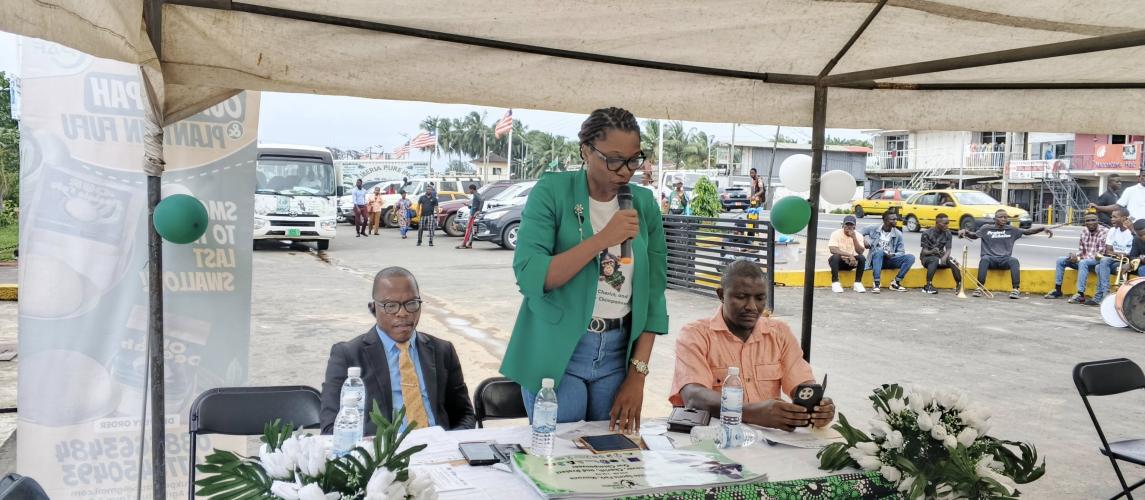
Liberia Unites to Protect ‘Forest Architects’ on World Chimpanzee Day 2025
Monrovia, Liberia – July 14, 2025 — Liberia’s commitment to biodiversity conservation took center stage as the Forestry Development Authority (FDA), in collaboration with key national and international partners, hosted a vibrant celebration of World Chimpanzee Day at the Invincible Sports Park in Monrovia.
Held under the theme “Discover, Cherish, and Protect Our Chimpanzees,” the event underscored the ecological importance of chimpanzees and the urgent need for collective action to protect their shrinking habitats.
The day drew a wide spectrum of participants, including students, FDA staff, members of the diplomatic corps, development partners, and representatives from the Ministry of Information, Cultural Affairs, and Tourism (MICAT), reflecting a unified national stance on conservation.
Chimpanzees: Guardians of the Forest
Speaking at the event, Madam Nora G. Bowier, FDA’s Deputy Managing Director for Community, Conservation, and Carbon, emphasized the power of partnerships in conservation efforts. She expressed gratitude to co-host Wild Chimpanzee Foundation (WCF) and major funders such as the European Union, encouraging continued cooperation to preserve one of Liberia’s most vital species.
“We hope that following today’s event, we can deepen our understanding and strengthen our efforts to protect one of the most important animals in our forest ecosystem,” Bowier stated.
Delivering the keynote address, Assistant Information Minister for Tourism, Atty. Dogba K. Norris, Jr., described chimpanzees as “virtuous architects of Liberia’s rich and fragile forest ecosystem.” He highlighted their role in seed dispersal, biodiversity maintenance, and forest regeneration—functions that directly contribute to climate stability, water security, and sustainable livelihoods.
Alarming Threats and Vanishing Forests
Norris raised the alarm over the accelerating threats to chimpanzee populations in Liberia and across West Africa. He pointed out that poaching and the illegal bushmeat trade account for over 50% of chimpanzee deaths, including within designated protected areas such as Sapo and Grebo-Krahn National Parks.
“Removing these animals on a large scale would trigger a domino effect, jeopardizing the entire forest ecosystem,” Norris warned.
Between 2001 and 2021, Liberia lost more than 1.3 million hectares of forest, representing an annual deforestation rate of 0.5%—a trend that continues to encroach on critical chimpanzee habitats.
Conservation in Action
In response to these threats, the event spotlighted ongoing conservation efforts, including the legal protection of habitats like Grebo-Krahn National Park, home to over 313 wild chimpanzees. Speakers emphasized the need to strengthen ranger training, expand forest monitoring, and involve local communities in alternative livelihoods such as sustainable farming and eco-tourism.
Victor W. Kpaiseh, FDA Deputy Managing Director, reinforced this approach, calling on NGOs and grassroots groups to unite in combating the illegal wildlife trade. He announced plans for expanded public awareness campaigns, radio outreach, and ranger deployments to curb poaching and protect endangered species.
Kpaiseh also acknowledged recent concerns from the French Ambassador regarding the visible sale of chimpanzee meat in urban markets, pledging increased enforcement and visibility for anti-bushmeat laws.
Celebration and Unity Through Sport
The day’s activities concluded on a lighter note with a spirited sports tournament, featuring kickball and football matches among FDA staff, MICAT, and conservation partners. In a show of camaraderie, the FDA lost narrowly in kickball (6–4), while the football game ended in a symbolic goalless draw, underscoring the spirit of balance and cooperation.
Closing the celebration, Madam Mai Urey, President of the Liberia National Tourism Association, thanked all attendees for their participation and encouraged them to remain vigilant stewards of Liberia’s rich biodiversity.
“Protecting our chimpanzees is not just an environmental duty—it is a national calling,” she affirmed.
